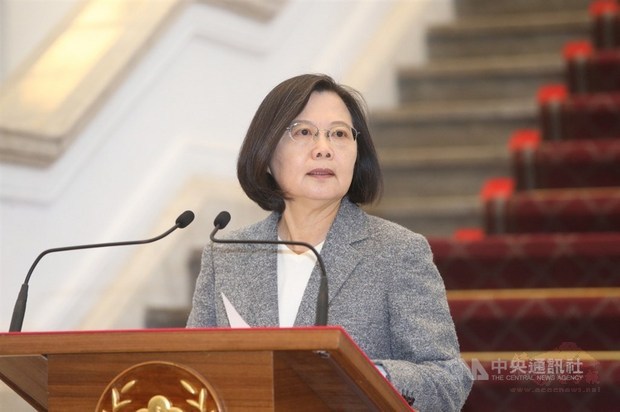
Taipei, Jan. 15 (CNA) President Tsai Ing-wen on Wednesday attempted to reassure the public that the Anti-infiltration Act will not affect nationals who conduct legal exchanges with Chinese counterparts, after officially promulgating the act into law earlier in the day.
In an address to the country made from the Presidential Office, Tsai said the act prohibits only a handful of actions; including making political donations; engaging in electioneering; sabotaging legal assembly; lobbying and interfering with elections; carried out under the instruction of China, commissioned or funded by China.
The act will not affect normal cross-strait exchanges, she stressed.
Amid concerns regarding the new law, the president said she has asked the Executive Yuan to make timely clarifications and explain the act to avoid causing unnecessary social panic.
The Executive Yuan has also been asked to establish an ad hoc task force to provide the public with examples of actions that violate the act, and those that do not, so people have clearer guidance to follow, she said.
The Straits Exchange Foundation (SEF), a semi-official intermediary body that deals with cross-strait affairs, has also been tasked with answering inquiries about the law, and collecting opinions from the public so the government can make future adjustments if necessary, Tsai said.
Despite the president's repeated assurances, main opposition Kuomintang (KMT) caucus whip Tseng Ming-chung on Wednesday warned that the lack of contingency plans represents a threat to people's basic rights as the law comes into force.
The 12-article-act does not specify which government agency is responsible for the implementation of the act. In addition, the act provides no legal remedy for individuals accused of violating related provisions, said Tseng.
A lack of contingencies shows the bill had been rushed through the lawmaking body without careful assessment, he noted, adding that the party will soon request a constitutional interpretation from the Constitutional Court on the legitimacy of the act as a last resort to overturn it.
In contrast, Democratic Progressive Party (DPP) caucus whip Lee Chun-yi said the law had to be passed first before the government could introduce any contingency plans.
The KMT, the smaller People First Party and Taiwanese business groups based in China have been vocal in their criticism of the act that was passed by the DPP-controlled Legislature on Dec. 31.
They claim that the bill, which was only initiated in late November with little cross-party discussion, lacks a concrete definition of what constitutes "infiltration," giving authorities the freedom to decide whether the law has been broken based on their own interpretation.
They expressed concern that the act could be used by the government to arbitrarily suppress those who hold different political views and hinder cross-strait exchanges.
According to the government, the act complements existing laws to prevent hostile forces from intervening in the nation's democratic political system or influencing national security through "infiltration sources."
"Infiltration sources" are defined in the act as organizations or institutions affiliated with the government, political parties or other political groups of a foreign hostile force, and individuals dispatched by those entities.
A hostile force is defined as a country or group at war or in a military standoff with Taiwan that upholds the idea of jeopardizing Taiwan's sovereignty by non-peaceful means, which clearly refers to China, although Mainland Affairs Council Minister Chen Ming-tong said the bill applies to all foreign hostile forces.
The act prohibits anyone from making political donations, influencing elections, proposing the recall of government officials, or launching a public referendum, at the instruction or with the financial support of an infiltration source.
It also prohibits lobbying on issues concerning national security, diplomacy and cross-strait affairs, at the instruction or with the financial support of an infiltration source.
The maximum penalty for such actions is five years in prison or a fine of NT$10 million (US$331,345), according to the act.